- Home
- Harlan Ellison
The Song the Zombie Sang Page 2
The Song the Zombie Sang Read online
Page 2
Her trembling hand hovered by the side of the chamber. Is this the switch?
She turned him on.
He came out of it. Eyes closed. Rising through a universe the color of aluminum. Again, then. Again. He thought he would stand there a moment with eyes closed, collecting himself, before going onstage. It got harder and harder. The last time had been so bad. In Los Angeles, in that vast building, balcony upon balcony, thousands of blank faces, the ultracembalo such a masterpiece of construction. He had opened the concert with Timi’s Ninth. So dreadful. A sluggish performance, note-perfect, the tempi flawless, and yet sluggish, empty, shallow. And tonight it would happen again. Shamble out on stage, don the gloves, go through the dreary routine of re-creating the greatness of Nils Bekh.
His audience, his adoring followers. How he hated them! How he longed to turn on them and denounce them for what they had done to him. Schnabel rested. Horowitz rested. Joachim rested. But for Bekh there was no rest. They had not allowed him to go. Oh, he could have refused to let them sustain him. But he had never been that strong. He had had strength for the loveless, lightless years of living with his music, yes. For that there had never been enough time. Strong was what he had had to be. To come from where he had been, to learn what had to be learned, to keep his skills once they were his. Yes. But in dealing with people, in speaking out, in asserting himself… in short, having courage… no, there had been very little of that. He had lost Dorothea, he had acceded to Wizmer’s plans, he had borne the insults Lisbeth and Neil and Cosh—ah, gee, Cosh, was he still alive?—the insults they had used to keep him tied to them, for better or worse, always worse. So he had gone with them, done their bidding, never availed himself of his strength—if in fact there was strength of that sort buried somewhere in him—and in the end even Sharon had despised him.
So how could he go to the edge of the stage, stand there in the full glare of the lights and tell them what they were? Ghouls. Selfish ghouls. As dead as he was, but in a different way. Unfeeling, hollow.
But if he could! If he could just once outwit the corporation man, he would throw himself forward and he would shout—
Pain. A stinging pain in his cheek. His head jolted back; the tiny pipes in his neck protested. The sound of flesh on flesh echoed in his mind. Startled, he opened his eyes. A girl before him. The color of aluminum, her eyes. A young face. Fierce. Thin lips tightly clamped. Nostrils flaring. Why is she so angry? She was raising her hand to slap him again. He threw his hands up, wrists crossed, palms forward, to protect his eyes. The second blow landed more heavily than the first. Were delicate things shattering within his reconstructed body?
The look on her face! She hated him.
She slapped him a third time. He peered out between his fingers, astonished by the vehemence of her eyes. And felt the flooding pain, and felt the hate, and felt a terribly wonderful sense of life for just that one moment. Then he remembered too much, and he stopped her.
He could see as he grabbed her swinging hand that she found his strength improbable. Fifteen years a zombie, moving and living for only seven hundred four days of that time. Still, he was fully operable, fully conditioned, fully muscled.
The girl winced. He released her and shoved her away. She was rubbing her wrist and staring at him silently, sullenly.
“If you don’t like me,” he asked, “why did you turn me on?”
“So I could tell you I know what a fraud you are. These others, the ones who applaud and grovel and suck up to you, they don’t know, they have no idea, but I know. How can you do it? How can you have made such a disgusting spectacle of yourself?” She was shaking. “I heard you when I was a child,” she said. “You changed my whole life. I’ll never forget it. But I’ve heard you lately. Slick formulas, no real insight. Like a machine sitting at the console. A player piano. You know what player pianos were, Bekh. That’s what you are.”
He shrugged. Walking past her, he sat down and glanced in the dressing-room mirror. He looked old and weary, the changeless face changing now. There was a flatness to his eyes. They were without sheen, without depths. An empty sky.
“Who are you?” he asked quietly. “How did you get in here?”
“Report me, go ahead. I don’t care if I’m arrested. Someone had to say it. You’re shameful! Walking around, pretending to make music—don’t you see how awful it is? A performer is an interpretative artist, not just a machine for playing the notes. I shouldn’t have to tell you that. An interpretative artist. Artist. Where’s your art now? Do you see beyond the score? Do you grow from performance to performance?”
Suddenly he liked her very much. Despite her plainness, despite her hatred, despite himself. “You’re a musician.”
She let that pass.
“What do you play?” Then he smiled. “The ultracembalo, of course. And you must be very good.”
“Better than you. Clearer, cleaner, deeper. Oh, God, what am I doing here? You disgust me.”
“How can I keep on growing?” Bekh asked gently. “The dead don’t grow.”
Her tirade swept on, as if she hadn’t heard. Telling him over and over how despicable he was, what a counterfeit of greatness. And then she halted in midsentence. Blinking, reddening, putting hands to lips. “Oh,” she murmured, abashed, starting to weep. “Oh. Oh!”
She went silent.
It lasted a long time. She looked away, studied the walls, the mirror, her hands, her shoes. He watched her. Then, finally, she said, “What an arrogant little snot I am. What a cruel foolish bitch. I never stopped to think that you—that maybe—I just didn’t think—” He thought she would run from him. “And you won’t forgive me, will you? Why should you? I break in, I turn you on, I scream a lot of cruel nonsense at you—”
“It wasn’t nonsense. It was all quite true, you know. Absolutely true.” Then, softly, he said, “Break the machinery.”
“Don’t worry. I won’t cause any more trouble for you. I’ll go, now. I can’t tell you how foolish I feel, haranguing you like that. A dumb little puritan, puffed up with pride in her own art. Telling you that you don’t measure up to my ideals. When I—”
“You didn’t hear me. I asked you to break the machinery.”
She looked at him in a new way, slightly out of focus. “What are you talking about?”
“To stop me. I want to be gone. Is that so hard to understand? You, of all people, should understand that. What you say is true, very very true. Can you put yourself where I am? A thing, not alive, not dead, just a thing, a tool, an implement that, unfortunately, thinks and remembers and wishes for release. Yes, a player piano. My life stopped and my art stopped, and I have nothing to belong to now, not even the art. For it’s always the same. Always the same tones, the same reaches, the same heights. Pretending to make music, as you say. Pretending.”
“But I can’t—”
“Of course you can. Come, sit down, we’ll discuss it. And you’ll play for me.”
“Play for you?”
He reached out his hand and she started to take it, then drew her hand back. “You’ll have to play for me,” he said quietly. “I can’t let just anyone end me. That’s a big, important thing, you see. Not just anyone. So you’ll play for me.” He got heavily to his feet. Thinking of Lisbeth, Sharon, Dorothea. Gone, all gone now. Only he, Bekh, left behind, some of him left behind, old bones, dried meat. Breath as stale as Egypt. Blood the color of pumice. Sounds devoid of tears and laughter. Just sounds.
He led the way, and she followed him, out onto the stage, where the console still stood uncrated. He gave her his gloves, saying, “I know they aren’t yours. I’ll take that into account. Do the best you can.” She drew them on slowly, smoothing them.
She sat down at the console. He saw the fear in her face, and the ecstasy, also. Her fingers hovering over the keys. Pouncing. God, Timi’s Ninth! The tones swelling and rising, and the fear going from her face. Yes. Yes. He would not have played it that way, but yes, just so. Timi’s notes filter
ed through her soul. A striking interpretation. Perhaps she falters a little, but why not? The wrong gloves, no preparation, strange circumstances. And how beautifully she plays. The hall fills with sound. He ceases to listen as a critic might; he becomes part of the music. His own fingers moving, his muscles quivering, reaching for pedals and stops, activating the pressors. As if he plays through her. She goes on, soaring higher, losing the last of her nervousness. In full command. Not yet a finished artist, but so good, so wonderfully good! Making the mighty instrument sing. Draining its full resources. Underscoring this, making that more lean. Oh, yes! He is in the music. It engulfs him. Can he cry? Do the tearducts still function? He can hardly bear it, it is so beautiful. He has forgotten, in all these years. He has not heard anyone else play for so long. Seven hundred four days. Out of the tomb. Bound up in his own meaningless performances. And now this. The rebirth of music. It was once like this all the time, the union of composer and instrument and performer, soul-wrenching, all-encompassing. For him. No longer. Eyes closed, he plays the movement through to its close by way of her body, her hands, her soul. When the sound dies away, he feels the good exhaustion that comes from total submission to the art.
“That’s fine,” he said, when the last silence was gone. “That was very lovely.” A catch in his voice. His hands were still trembling; he was afraid to applaud.
He reached for her, and this time she took his hand. For a moment he held her cool fingers. Then he tugged gently, and she followed him back into the dressing room, and he laid down on the sofa, and he told her which mechanisms to break, after she turned him off, so he would feel no pain. Then he closed his eyes and waited.
“You’ll just—go?” she asked.
“Quickly. Peacefully.”
“I’m afraid. It’s like murder.”
“I’m dead,” he said. “But not dead enough. You won’t be killing anything. Do you remember how my playing sounded to you? Do you remember why I came here? Is there life in me?”
“I’m still afraid.”
“I’ve earned my rest,” he said. He opened his eyes and smiled. “It’s all right. I like you.” And, as she moved toward him, he said, “Thank you.”
Then he closed his eyes again.
She turned him off. Then she did as he had instructed her.
Picking her way past the wreckage of the sustaining chamber, she left the dressing room. She found her way out of the Music Center —out onto the glass landscape, under the singing stars, and she was crying for him.
Laddy. She wanted very much to find Laddy now. To talk to him. To tell him he was almost right about what he’d told her. Not entirely, but more than she had believed… before. She went away from there. Smoothly, with songs yet to be sung.
And behind her, a great peace had settled. Unfinished, at last the symphony had wrung its last measure of strength and sorrow.
It did not matter what Weatherex said was the proper time for mist or rain or fog. Night, the stars, the songs were forever.
FB2 document info
Document ID: fbd-cdd977-1c10-9d43-2d87-40a6-dd72-5c020e
Document version: 1
Document creation date: 14.04.2012
Created using: Fiction Book Designer, FictionBook Editor Release 2.6 software
Document authors :
Xenophile
About
This file was generated by Lord KiRon's FB2EPUB converter version 1.1.5.0.
(This book might contain copyrighted material, author of the converter bears no responsibility for it's usage)
Этот файл создан при помощи конвертера FB2EPUB версии 1.1.5.0 написанного Lord KiRon.
(Эта книга может содержать материал который защищен авторским правом, автор конвертера не несет ответственности за его использование)
http://www.fb2epub.net
https://code.google.com/p/fb2epub/

 Repent, Harlequin! Said the Ticktockman
Repent, Harlequin! Said the Ticktockman Broken Glass
Broken Glass Other Glass Teat
Other Glass Teat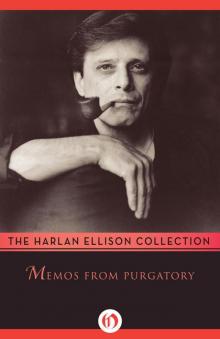 Memos From Purgatory
Memos From Purgatory I Have No Mouth and I Must Scream
I Have No Mouth and I Must Scream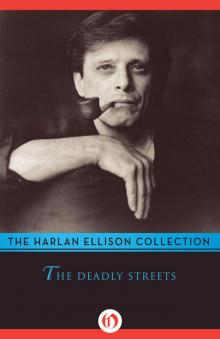 The Deadly Streets
The Deadly Streets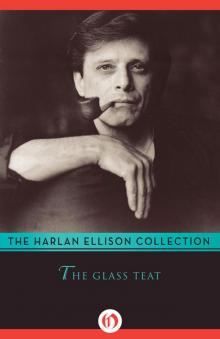 The Glass Teat
The Glass Teat Paingod and Other Delusions
Paingod and Other Delusions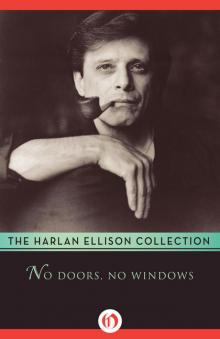 No Doors No Windows
No Doors No Windows Strange Wine
Strange Wine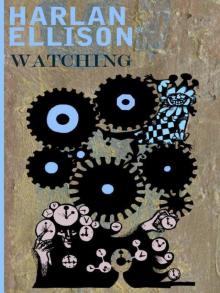 Harlan Ellison's Watching
Harlan Ellison's Watching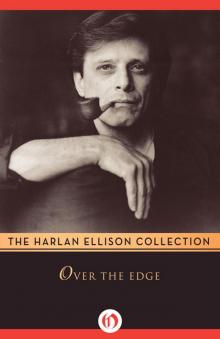 Over the Edge/An Edge in My Voice
Over the Edge/An Edge in My Voice Troublemakers: Stories by Harlan Ellison
Troublemakers: Stories by Harlan Ellison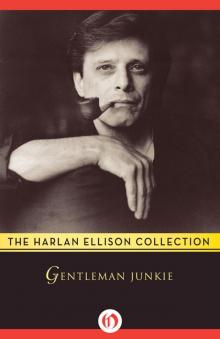 Gentleman Junkie and Other Stories of the Hung-Up Generation
Gentleman Junkie and Other Stories of the Hung-Up Generation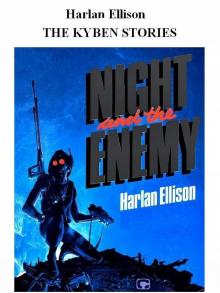 The Kyben Stories
The Kyben Stories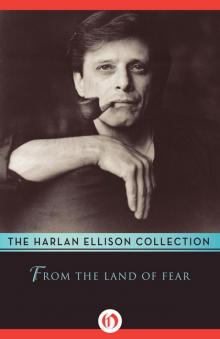 From the Land of Fear
From the Land of Fear The Top of the Volcano: The Award-Winning Stories of Harlan Ellison
The Top of the Volcano: The Award-Winning Stories of Harlan Ellison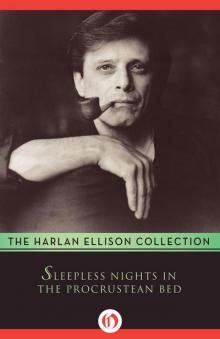 Sleepless Nights in the Procrustean Bed
Sleepless Nights in the Procrustean Bed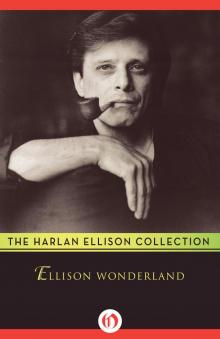 Ellison Wonderland
Ellison Wonderland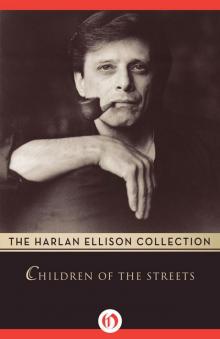 Children of the Streets
Children of the Streets Can & Can'tankerous
Can & Can'tankerous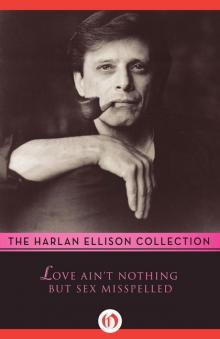 Love Ain't Nothing but Sex Misspelled
Love Ain't Nothing but Sex Misspelled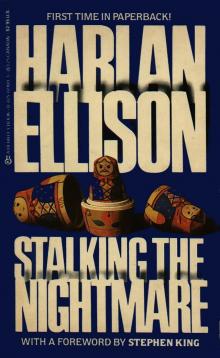 Stalking the Nightmare
Stalking the Nightmare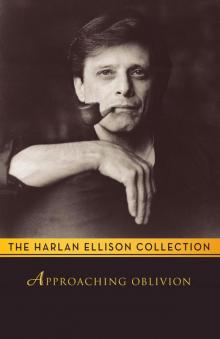 Approaching Oblivion
Approaching Oblivion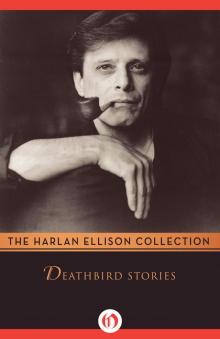 Deathbird Stories
Deathbird Stories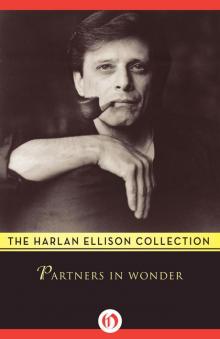 Partners in Wonder
Partners in Wonder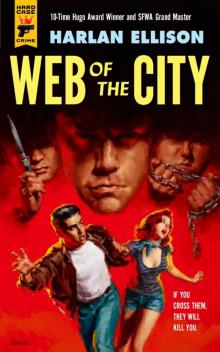 Web of the City
Web of the City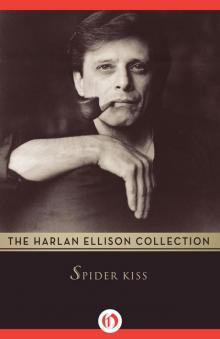 Spider Kiss
Spider Kiss A Boy and His Dog
A Boy and His Dog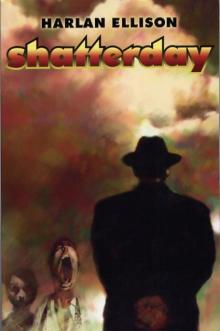 Shatterday
Shatterday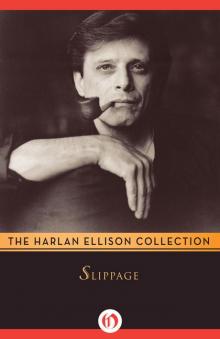 Slippage: Previously Uncollected, Precariously Poised Stories
Slippage: Previously Uncollected, Precariously Poised Stories Repent, Harlequin! Said the Ticktockman
Repent, Harlequin! Said the Ticktockman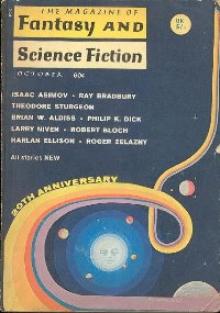 Come to Me Not in Winter's White
Come to Me Not in Winter's White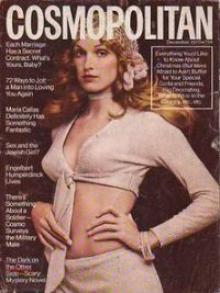 The Song the Zombie Sang
The Song the Zombie Sang The Other Glass Teat
The Other Glass Teat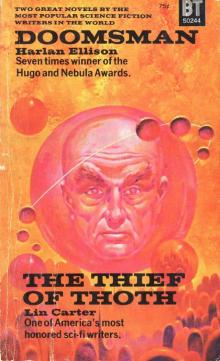 Doomsman - the Theif of Thoth
Doomsman - the Theif of Thoth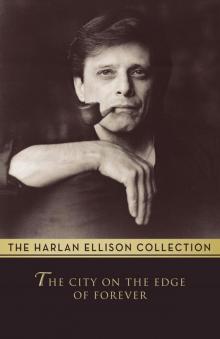 The City on the Edge of Forever
The City on the Edge of Forever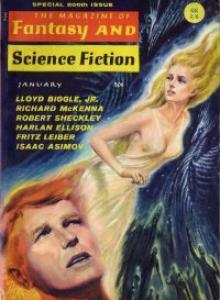 I See a Man Sitting on a Chair, and the Chair Is Biting His Leg
I See a Man Sitting on a Chair, and the Chair Is Biting His Leg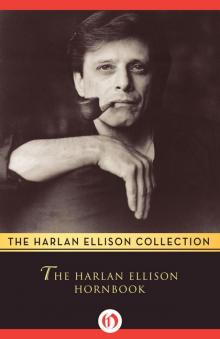 The Harlan Ellison Hornbook
The Harlan Ellison Hornbook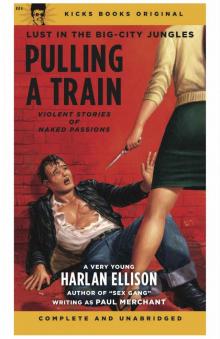 Pulling A Train
Pulling A Train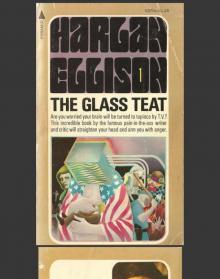 The Glass Teat - essays of opinion on the subject of television
The Glass Teat - essays of opinion on the subject of television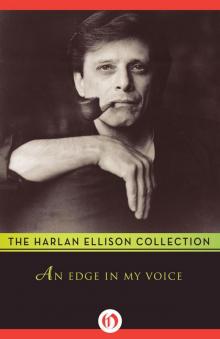 An Edge in My Voice
An Edge in My Voice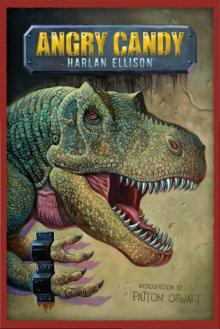 Angry Candy
Angry Candy Troublemakers
Troublemakers The Top of the Volcano
The Top of the Volcano Over the Edge
Over the Edge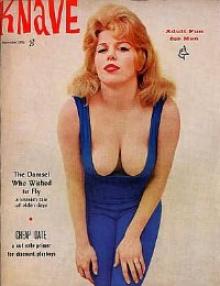 Survivor #1
Survivor #1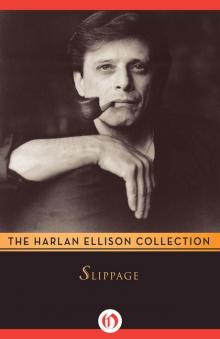 Slippage
Slippage